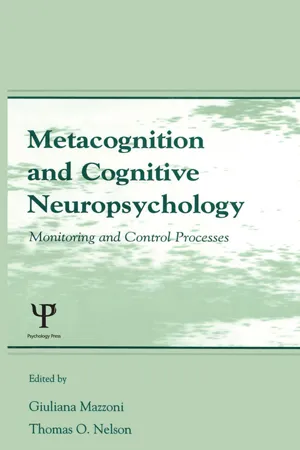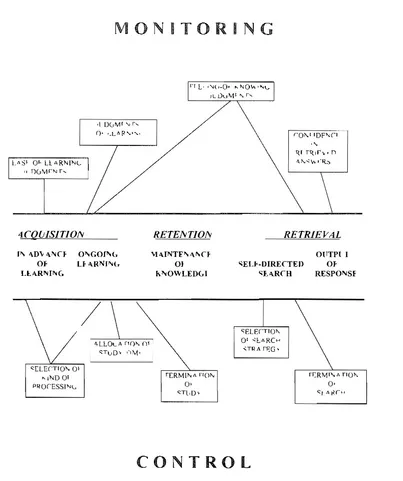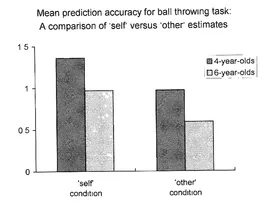![]()
1
The Development of Procedural Metamemory in Childhood and Adolescence
Wolfgang Schneider
University of Wuerzburg, Germany
More than 25 years ago, Flavell (1971) coined the term metamemory to refer to knowledge about memory processes and contents. Although this concept has gained considerable attention in the literature and has proved important for describing and explaining developmental changes in the memory domain, it has also been criticized because of its obvious "fuzziness."
One major source of confusion concerning the widespread use of the construct is that it has been used to refer to two distinct areas of research, namely factual knowledge about memory and monitoring and regulation of memory processes. Factual knowledge about memory has also been labeled declarative metamemory and refers to the relatively stable, statable, often fallible, and late-developing information that children have about their own memory processes and those of others. In their taxonomy of declarative metamemory, Flavell and Wellman (1977) included categories such as knowledge about person characteristics (mnemonic self-concept), knowledge about task characteristics, and knowledge about potentially applicable memory strategies. Paris and colleagues (e.g., Paris & Lindauer, 1982; Paris & Oka, 1986) later introduced an additional component of declarative metamemory called conditional metacognitive knowledge that focused on children's ability to justify or explain their decisions concerning memory actions. Whereas declarative metamemory assessed by Flavell and colleagues focuses on "knowing that," the component added by Paris and coworkers deals with " knowing why" information.
The second area of metamemory research, memory monitoring and self-regulation, has also been labeled procedural metamemory in the literature (cf. Borkowski, Milstead, & Hale, 1988; Schneider & Bjorklund, 1998; Schneider & Pressley, 1997). Brown and her colleagues (cf. Baker & Brown, 1984; Brown, 1978; Brown, Bransford, Ferrara, & Campione, 1983) were the first to explore the procedural metamemory component, assessing children's ability to monitor and regulate their memory behavior during ongoing memory activities ("knowing how"). Here, the frame of reference was the competent information processor, one possessing an efficient executive that regulated cognitive behaviors. Brown and colleagues took the perspective that memory monitoring and regulation processes play a large role in executive actions, and that considerable developmental differences can be observed for these variables. In particular, it was assumed that monitoring and regulating behaviors are crucial in more complex cognitive tasks such as comprehending and memorizing text materials (e.g., Baker & Brown, 1984; Brown et al., 1983; Garner, 1987).
In this chapter, I want to summarize the state of the art regarding developmental trends in procedural metamemory. A more recent theoretical model relating memory monitoring and self-regulation is presented first, followed by an overview of developmental studies focusing on memory monitoring. Next, empirical research tapping the development of self-regulation skills and their interrelations with memory monitoring processes is discussed. Studies dealing with relations between both components of procedural metacognitive knowledge and memory performance as well as the developmental trends in these relations are summarized in the last section of the chapter.
Nelson and Narens’ Model of Procedural Metamemory
One possibility for exploring the role of procedural metamemory in actual behavior is to look at how children use their knowledge to monitor their own memory status and regulate their memory activities. According to Nelson and Narens (1990, 1994), self-monitoring and self-regulation correspond to two different levels of metacognitive processing. Self-monitoring refers to keeping track of where you are with regard to your goal of understanding and remembering (bottom-up process). On the other hand, self-regulation refers to central executive activities and includes planning, directing, and evaluating your behavior (top-down process).
Nelson and Narens (1990, 1994) referred to servomechanisms such as the thermostat in order to describe the interplay between components of procedural metamemory. In their model, a metalevel is distinguished from an object level of cognitive functioning (cf. Fig. 1.1.). Control processes are linked to the metalevel and are thought to directly influence the object level. It is assumed that the metalevel modifies the object level, but not vice versa. In particular, the information flowing from the metalevel to the object level either changes the state of the object level process or changes the object level process itself. Because control per se does not yield any information from the object level, monitoring processes are assumed to inform the metalevel about the current state of the object level. Nelson and Narens assume that this may change the metalevel's model of the situation and eventually lead to control activities. It seems important to note that whereas the metalevel has a model of the object level, the reverse is not true.
FIG. 1.1 The model of procedural metamemory developed by Nelson and Narens (1990).
The various monitoring and self-regulation components assumed to be relevant for efficient information processing are shown in Fig. 1.1. They are depicted as a function of the stages of information acquisition, retention, and retrieval. So far, developmental research has focused on monitoring components such as ease-of-learning (EOL) judgments, judgments of learning (JOL), and feeling-of-knowing (FOK) judgments, and has also explored some aspects of control and self-regulation such as allocation of study time and termination of study. Empirical findings concerning developmental trends in these variables are summarized next.
Developmental Trends Concerning Procedural Metamemory EOL
EOL judgments occur in advance of the learning process, are largely inferential, and refer to items that have not yet been learned. The corresponding memory paradigm is performance prediction in various retention tasks. Performance predictions, as the name implies, are made prior to study of the to-be-remembered material and involve estimation of how much will be learned. A form of performance prediction that has been used often in developmental research is prediction of one's own memory span (e.g., Flavell, Friedrichs, & Hoyt, 1970). Individuals are presented incrementally longer lists of materials to be learned (pictures, words, or figures) and are asked to indicate whether they could still recall a list that long. The child's memory span is then tapped using the same lists. Comparisons of the prediction value with actual memory span yields the metamemory indicator, which is usually interpreted as a by-product of memory monitoring (i.e., children who have monitored their memory proficiently in the past should be more aware of their memory span than children who have not monitored at all or not monitored well in the past). Performance prediction accuracy can be measured for a variety of memory tasks, with recent applications to text learning (e.g., Schneider, Körkel, & Weinert, 1990; Schneider & Uhl, 1990).
Most studies on EOL judgments using list-learning paradigms have found that preschool and kindergarten children overpredict their memory performance, whereas elementary school children are much more accurate (e.g., Flavell et al., 1970; Schneider, 1986; Schneider, Borkowski, Kurtz, & Kerwin, 1986; Worden & Sladewski-Awig, 1982; Yussen & Levy, 1975). Whether elementary school children over- or underestimate performance seems to vary with the memory task. For example, serial memory span is usually overestimated, whereas recall of categorizable lists is underestimated (cf. Flavell et al., 1970; Worden & Sladewski-Awig, 1982). The latter finding is probably not surprising given elementary-school children's lack of awareness of the effects of categorizing on memory. Recent studies also indicate that individual differences in aptitude do not have significant effects on estimation accuracy (cf. Alexander, Carr, & Schwanenflugel, 1995).
Several studies have tried to identify young children's difficulties in making accurate performance predictions. One likely possibility is that many memory tasks are completely unfamiliar to preschoolers. It was found that young children's predictions tended to be more accurate in familiar situations than in unfamiliar, laboratory-type situations. Thus preschool children make more realistic predictions when asked how far they can jump (Markman, 1973; Schneider, in press). Predictions are also more accurate when assessments of memory span are nonverbal rather than verbal (Cunningham & Weaver, 1989) or are conducted in a familiar context, such as a game (Wippich, 1981).
A particularly interesting question is whether predictions of overall performance improve in accuracy as experience with the memory task increases. There seems to be developmental improvement here. In the studies by Schneider and colleagues (Schneider, 1986; Schneider et al, 1986; Schneider & Uhl, 1990), participants made a prediction before attempting a list-learning task. Then, after completing the list-learning task and test of the material on the list, the participants were told that they would be doing another list-learning task and were asked to predict performance on this second list. Although first and second predictions did not differ in accuracy for Grade 2 and Grade 3 children, Grade 4 children's predictions became more accurate with practice. Pressley and Ghatala (1989) provided complementary data. In their study, Grade 1 and 2, Grade 4 and 5, and Grade 7 and 8 participants predicted performance on a vocabulary test, took the test, and then predicted performance on a future test of comparable difficulty. Although there was no evidence of prediction improvement from first to second prediction at the Grade 1 and 2 level, there was a strong trend toward improvement at the Grade 4 and 5 level and unambiguous improvement from first to second prediction at the Grade 7 and 8 level.
More negatively, prediction improvement maybe limited to tasks involving fairly simple materials. When Schneider and Uhl's (1990) participants went through the prediction-learning-testing-prediction-learning-testing cycle with prose materials, there were no improvements in prediction with practice. Schneider and Uhl speculated that accurate awareness of the amount recalled on a test of prose content may be less certain than accurate awareness for list items, and thus, test monitoring during prose study and testing might not be sufficient to permit improvements in predictions about future prose learning.
One problem with the performance prediction paradigm is that it may not only tap metacognitive processes, particularly when it is carried out with young children. Researchers of achievement motivation (Stipek, 1984; Stipek & Mac Iver, 1989) using performance prediction in order to assess young children's level of aspiration in motor tasks found that children's performance predictions seem confounded by motivational factors such as wishful thinking. This means that young children are estimating what they would like to get rather than what they think they will get. In a subsequent study using both motor and memory tasks, Schneider (in press) confirmed this assumption. Like Stipek (1984), Schneider found that preschoolers and kindergartners can be rather accurate when asked to predict the performance of other children, as compared to their own performance (cf. Fig. 1.2).
This finding is in line with the wishful thinking hypothesis: Given their egocentric stage, young children's desires are restricted to their own performance and do not necessarily generalize to achievements of their peers. However, this finding is not compatible with the metacognitive deficiency hypothesis because poor memory monitoring should yield similar outcomes in both conditions. Thus young children's poor EOL judgments seem not particularly due to deficiencies in memory monitoring, but may be strongly affected by motivational factors such as wishful thinking or beliefs in the power of effort (cf. Stipek, 1984; Wellman, 1985). However, because such motivational processes are not similarly influential in schoolchildren, there are subtle improvements over the elementary school years (Körkel, 1987; Pressley &Ghatala, 1990; Schneider et al., 1990; Schneider & Uhl, 1990).
FIG. 1.2 Differences in estimating accuracy concerning one's performance versus another-child's performance (data from Schneider, in press).
JOL Tasks
Similar developmental trends were observed for performance on JOL tasks. In a few developmental studies, children's postdictions (i.e., their judgments of performance accuracy after the fact) were evaluated (Bisanz, Vesonder, & Voss, 1978; Pressley, Levin, Ghatala, & Ahmad, 1987). For instance, Pressley et al. (1987) compared 7- and 10-year-olds' postdictions for word lists and individual items. There were two major findings: (a) although rather accurate postdictions were found even for the younger age group, the older children were significantly better; and (b) those children who were most accurate with regard to estimating performance on individual items were not similarly accurate when asked to postdict performance on the entire list, and vice versa. It appears, then, that these two tasks tap different aspects of the estimation process.
In a more recent study, Schneider, ...


